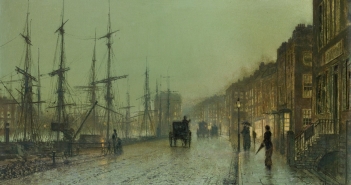Taking advantage of their last night in the city, Boris and Semyon went to a theatre, something neither of them had done since childhood. But as luck would have it, at some point during the show, Boris’s wallet was stolen. He was upset, and more so when the police officers exchanged glances before giving him little hope of its recovery.
“You see, Sir, we understand that Vendev was working the crowd last night, and Vendev can’t be caught. He is the cleverest thief who has ever operated in Belarus. Sometimes he works the same place for a week, but no one sees the slightest movement in the crowd when someone shouts ‘Stop thief!’ We’ve had dozens of reports and the leisure to compare them. He works alone and only in one place at a time, stealing a maximum of three wallets an hour. As for physical descriptions, he might be anything from a choirboy to Rurik the Varangian. All we know is his name…if that. His name is rumored about with a strange story of the reason that he steals…”
The two men from Cosen were not comforted. Next morning, Boris couldn’t bring himself to take his train. Instead, he returned to the Pearl Theatre and sat on the terrace of an adjacent café. It was obvious he would not get his wallet back like that, so he must have been merely mourning it, like the simple-hearted fellow he was. A pure and harmless, even touching ritual. One which Semyon did not savor.
Semyon was the cleverer of the two. Anyone could see that in a glance at those quicker eyes flickering from his expressive face. Impatient with Boris’s ruminative slowness, you could see him there licking and sniffing, as if smelling the humid soil back in Cosen. He was eager to get that train out of this larcenous, immoral town and begin the fall plowing. But Boris could not sense all the strange city things now tickling Semyon’s nose.
The well-proportioned man in nondescript brown who sauntered out of the café had pleasant brown eyes, and seemed in his late twenties. Upon seeing Boris, he stared as if seeing an old friend, then strode to their table, taking a chair very near indeed to Semyon.
“Good morning, my fine fellows! So seldom you get up from the farm! From the north, are we?”
Semyon did not care to be so acutely read by a stranger, and stiffly replied, “From Cosen, Pán Stranger.” Though nearly on Semyon’s lap, the man addressed his conversation to Boris alone.
“You are from Cosen! A sweet place, Cosen. But shabby. The manufacture? Why, nothing, Sir. Nothing at all!”
Boris’s pride in Cosen was equal only to his ignorance of everywhere else. “It is not necessary for Cosen to manufacture,” he maintained loudly with a sweet, ingenuous smile. “Cosen is, as everyone knows, engaged in trade. And while Königsberg is boasted for its trade,” he compared his village to a great Baltic port with utter naivete, “A greater variety of food is eaten at all times of the year by people in Cosen than by those in Königsberg.”
Semyon fidgeted uneasily, increasingly sure that the stranger was not smiling so broadly with Boris, but at him.
“And you caught the show last night,” continued the young man in a fashion which was nothing short of uncanny. “How did you like it? What sort of performance?”
“Oh, Madame Yelisaveta Can-Shay,” returned Boris, smiling to Slavicly mangle her name in what he considered a rendering both cultivated and French. “She does all sorts of things. First she acted a skeet,” he tried to say ‘skit,’ “Which I did not understand at all, but Semyon, there, found it funny. Then she danced with a little dog, looking exactly like a priest’s beard on legs…”
“Madame, or the dog?” offered the young man, causing Boris an attack of laughter that rattled the table.c
“And then, behind a screen, she moved puppets which looked like tiny people. And talked for them! She didn’t sound a bit like herself. It was miraculous! Afterwards, the theatre director himself walked out on stage, in a splendid suit, looking like a bridegroom! He thanked her, and we clapped like mad. Semyon and I, I mean, for the others were so shy. These city people! And the director seemed to want an encore very much, so I shouted ‘Encore!’ I was the only one, so it was very fortunate I was there, or the director and Panny Can-shay might have felt so badly. She sang Encore for us, which is a song. And that was all.”
The young man seemed simply overcome by this gallantry towards Madame Canché, and rose to embrace Boris. For the first time since his arrival, Semyon could move his left arm.
“But it was all dreadful and we should never have come,” said Semyon bitterly, while the young man showed no more partiality for the previous seat set against his ribs, and sat equidistant between the men, “Because Boris’s wallet was stolen and the police don’t think it will be recovered.”
“Stolen by Vendev!” exclaimed the young man with enthusiasm, leaning forward with brightened eyes. “He was in the Pearl last night. I read it in the paper. By reports, he took six wallets and a lady’s Lyon silk handbag.”
“The scoundrel!” cried Semyon, his thin knees involuntarily jerking.
To which the young man sighed deeply. “Do you know nothing of Vendev?”
“Oh, the police told us everything.” Perhaps it was that note of childish arrogance in Semyon’s voice, but the young man’s full attention, once all Boris’s, was now his. “They say no one ever sees him, that he takes three wallets an hour, that he looks like a choirboy or Rurik the Vavavian, and something odd about him paying a debt to God.”
“That’s it!” The young man slapped the table. “That’s Vendev. Listen. You mustn’t call him a scoundrel. It’s the strangest story. Many years ago, Vendev, who was an honest man then, made a bet with God. He expected to win, but lost. Don’t ask me what the bet was, because I don’t know. He had to pay the debt with stolen money. Perhaps because he was too poor. Perhaps those were the terms of his penance. He became the finest of pickpockets, and labors year after year, straining to pay his debt and be free. To be an honest man once again. That is Vendev.”
The young man looked keenly round on his audience, especially Semyon, waiting to see if either pure-hearted Christian peasant would contest the vile theology and viler blasphemy of the tale. But Boris stared, full of wonder and…good land! There were tears in his eyes! While Semyon’s inexpertly controlled face clearly betrayed that though he found the story revolting, Semyon was afraid to criticize a city gentleman’s morals for fear of being called ignorant and out-of-step with the times. The young man’s smile widened in triumph, and as timid Semyon smiled back despite ignorance of the joke, the young man seemed about to be reduced to helpless laughter!
Then it happened: Semyon’s hand had been automatically seeking his wallet every quarter of an hour for the past eleven, and did so now. It crawled over the rusty woolen vest like an eager crab to caress his pocket, and froze in disbelieving horror before it felt again, fumbling and pinching. A look like death by poison spread over Semyon’s lined face. The young man appeared to see nothing and twitched Boris’s lapel playfully, asking whether he were married. Semyon’s face had grown hard, his stare on the young man’s back like that of a hunter at a fearsome but cornered bear.
But the young man knew that Semyon’s ideas of how to deal with a thief were as hard, as rigid and formulaic, as his stare. The young man crossed his legs comfortably and laughed when Boris said that yes he was, praise the Lord, married. A thief must know, better than anyone, the little signs that betray a man, for he has more to lose, and Vendev knew that Semyon, even if he could manage to conceive of a thief who did not immediately dart away, was incapable of calling ‘Stop Thief!’ on a sitting man. He would be equally incapable of announcing a thief with any other cry than the time-honored ‘Stop Thief!’ Just as he was incapable of buttoning down his waistcoat in the new fashion, but felt compelled to button it up to his chin. Vendev knew that for as long as he, Vendev, sat on the chair, he was as safe as if in France, and that he could sit in a chair indefinitely. Whereas if the two hardworking farmers tried to sit on chairs in broad daylight, on a weekday, for more than an hour, they would either die or explode.
Vendev took out a cigarette, which he then lit and enjoyed at leisure, savoring that first bouquet of smoke, a conscience that had been trained not to bother him, and the pleasant weight of Semyon’s wallet. Won the gentleman’s way. In a contest of wits.




